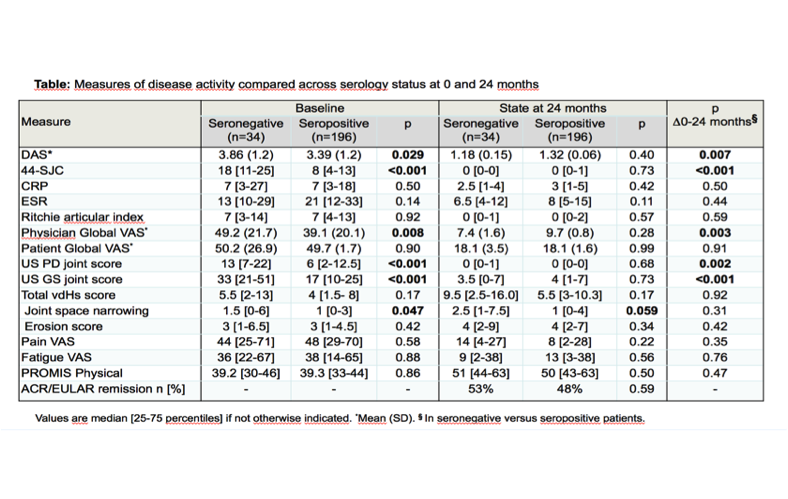Session Information
Date: Sunday, November 5, 2017
Title: Rheumatoid Arthritis – Clinical Aspects Poster I: Treatment Patterns and Response
Session Type: ACR Poster Session A
Session Time: 9:00AM-11:00AM
Background/Purpose:
The development of the 2010 classification criteria for rheumatoid arthritis (RA) has led to a redefinition of the patient population, including classification of seropositive versus seronegative patients (1). In our recently published study of early RA patients fulfilling the 2010 ACR/EULAR criteria, we found seronegative patients to have markedly higher disease activity at time of diagnosis, compared to seropositive patients (2). There is very limited information about the disease course of seronegative patients classified according to the new criteria. Our aim was to examine the disease course of seronegative RA patients fulfilling the 2010 ACR/EULAR criteria.
Methods:
In the treat-to-target ARCTIC trial, DMARD-naive RA patients classified according to the 2010 EULAR/ACR criteria were randomised 1:1 to follow-up with or without ultrasound. Patients in both arms were treated according to the same DMARD escalation strategy. Patients were assessed at 13 visits during two years of follow-up (3).
We stratified the patients as seropositive (rheumatoid factor (RF)+, anti-citrullinated peptide antibody (ACPA)+, or both) or seronegative (RF– and ACPA-). At baseline and 24-month follow-up, disease activity measures were compared across groups using independent t-test or Mann-Whitney U test as appropriate. We also compared the change in disease activity measures from 0-24 months across groups.
Results:
A total of 230 patients were included. Mean (SD) age was 51.4 (13.7) years and 61.3 % were female; 34 patients (14.8%) were seronegative. Mean age (SD) was 55.4 (2.7)/ 50.8 (0.9) years (p=0.07), mean (SD) disease duration was 7.7 (6.8)/7.0 (5.1) months (p=0.46), and 56/62 % were females (p=0.48) in the seronegative/seropositive groups.
At baseline disease activity measures and radiographic joint space narrowing were higher in seronegative compared to seropositive patients. At 24-month follow-up, measures of disease activity were similar between groups (table). There was a tendency towards more radiographic damage in terms of joint space narrowing in the seronegative patients.
Seronegative patients had a greater reduction (0-24 months) in disease activity measures in terms of DAS, swollen joints, physician global and ultrasound scores (table).
Conclusion:
In this study of early RA patients, seronegative patients had more inflammatory activity at baseline and a tendency to more radiographic damage, but disease activity after two years of treat-to-target therapy was similar to the seropositive patients. Our findings suggest that seronegative patients classified according to the new criteria respond to modern treatment strategies, with similar rates of patients reaching remission compared to seropositive patients.
1. Aletaha, D., et al. 2010;ARD 2010;69: 1580-1588.
2. Nordberg LB et al. ARD 2017;76:341-345
3. Haavardsholm EA et al., BMJ 2016;354:i4205
To cite this abstract in AMA style:
Nordberg LB, Lillegraven S, Aga AB, Olsen IC, Lie E, Hammer HB, Uhlig T, van der Heijde D, Kvien T, Haavardsholm EA. Disease Course in Seronegative RA Patients Classified According to the 2010 ACR/EULAR Criteria [abstract]. Arthritis Rheumatol. 2017; 69 (suppl 10). https://acrabstracts.org/abstract/disease-course-in-seronegative-ra-patients-classified-according-to-the-2010-acreular-criteria/. Accessed .« Back to 2017 ACR/ARHP Annual Meeting
ACR Meeting Abstracts - https://acrabstracts.org/abstract/disease-course-in-seronegative-ra-patients-classified-according-to-the-2010-acreular-criteria/

